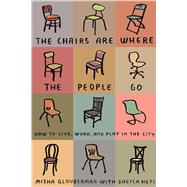
What is included with this book?
| Foreword | p. xi |
| People's Protective Bubbles Are Okay | p. 3 |
| How to Make Friends in a New City | p. 4 |
| The Uniqlo Game | p. 6 |
| Going to the Gym | p. 7 |
| How to Be Good at Playing Charades | p. 9 |
| Don't Pretend There Is No Leader | p. 12 |
| The Chairs Are Where the People Go | p. 15 |
| How to Teach Charades | p. 17 |
| Miscommunication Is Nice | p. 20 |
| The Gibberish Game | p. 21 |
| The Residents'Association | p. 23 |
| There Are Some Games I Won't Play with My Friends | p. 36 |
| Social Music | p. 37 |
| Manners | p. 39 |
| How to Improvise, and How Not to Not Improvise | p. 42 |
| The Crazy Parts | p. 46 |
| Charging for My Classes | p. 48 |
| What Is a Game? | p. 50 |
| Spam | p. 51 |
| Margaux | p. 55 |
| Charades Homework | p. 56 |
| Harvard and Class | p. 59 |
| The Rocks Game | p. 66 |
| Some Video on the Internet | p. 68 |
| People Who Take My Classes | p. 70 |
| Shut Up and Listen | p. 71 |
| Is Monogamy a Trick? | p. 72 |
| The Conducting Game | p. 75 |
| Sitting on the Same Side of the Table | p. 78 |
| Seeing My Friends Drunk for the First Time | p. 81 |
| A Decision Is a Thing You Make | p. 84 |
| All the Games Are Meant to Solve Problems, but Problems Are Unpleasant | p. 89 |
| Home Maladies | p. 90 |
| Keeping Away People Who Would Be Disappointed | p. 92 |
| The Happiness Class | p. 93 |
| The Converge/Diverge Game | p. 98 |
| Going to Parties | p. 101 |
| Kensington Market | p. 103 |
| Keeping People Quiet | p. 108 |
| Feeling Like a Fraud | p. 110 |
| Negotiation | p. 111 |
| Fighting Games | p. 113 |
| What Experimental Music Is For | p. 118 |
| These Projects Don't Make Money | p. 119 |
| Seeing Your Parents Once a Week | p. 122 |
| Asking a Good Question | p. 123 |
| A Mind Is Not a Terrible Thing to Measure | p. 125 |
| Doing One Thing Doesn't Mean You're Against Something Else | p. 128 |
| Get Louder or Quit | p. 129 |
| Why Robert McKee Is Wrong About Casablanca | p. 130 |
| Conferences Should Be an Exhilarating Experience | p. 132 |
| Improvised Behavior | p. 139 |
| Storytelling Is Not the Same Thing as Conversation | p. 140 |
| Introducing People in the Classes | p. 141 |
| Making the City More Fun for You and Your Privileged Friends Isn't a Super-Noble Political Goal | p. 143 |
| Seeing John Zorn Play Cobra | p. 145 |
| Impostor Syndrome | p. 148 |
| Nimbyism | p. 149 |
| Conducting from the Center of a Circle | p. 151 |
| Why Noise Music? | p. 153 |
| Absenteeism | p. 154 |
| Failure and Games | p. 155 |
| Why a Computer Only Lasts Three Years | p. 156 |
| What Are These Classes For? | p. 157 |
| Who Are Your Friends? | p. 159 |
| Neighborhoods Change | p. 160 |
| Atheism and Ritual | p. 162 |
| Social Capital | p. 164 |
| Sitting Down and Listening as a Role | p. 165 |
| Everyone's Favorite Thing and Unfavorite Thing Are Different | p. 167 |
| Finding an Ending | p. 168 |
| Wearing a Suit All the Time Is a Good Way to Quit Smoking | p. 169 |
| Acknowledgments | p. 175 |
| Table of Contents provided by Ingram. All Rights Reserved. |
The New copy of this book will include any supplemental materials advertised. Please check the title of the book to determine if it should include any access cards, study guides, lab manuals, CDs, etc.
The Used, Rental and eBook copies of this book are not guaranteed to include any supplemental materials. Typically, only the book itself is included. This is true even if the title states it includes any access cards, study guides, lab manuals, CDs, etc.